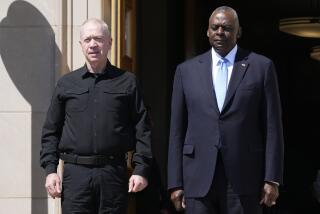Lebanese Premier Rules Out Peace Talks
- Share via
WASHINGTON — Lebanese Prime Minister Rafik Hariri on Thursday ruled out any step by his government to revive stalled Arab-Israeli negotiations, declaring that Lebanon will never make peace with Israel until Syria does.
In Washington for meetings today with President Clinton, Hariri made it clear that his government will follow where Damascus leads, asserting that the differences between Israel and Syria must be addressed first because they “are much more important and much more strategic” than the issues that separate Lebanon and Israel.
“Neither Syria nor Lebanon will sign a peace treaty with Israel without the other,” Hariri said.
Although no one in the Clinton administration expected Lebanon to challenge Syria--its larger and stronger neighbor--on strategy for dealing with Israel, the uncompromising tone of Hariri’s remarks came as a surprise.
Some officials in both Israel and the United States had hoped for progress in the less-complicated Israel-Lebanon negotiations to provide momentum that might carry over to discussions between Israel and Syria.
In a speech to the Center for Strategic and International Studies, a Washington think tank, Hariri also said his government will do nothing to rein in Hezbollah, the fundamentalist Islamic movement blamed for terrorist attacks on Israeli targets, until Israel withdraws from its self-declared “security zone” in southern Lebanon. Israel has said it will not withdraw until it reaches a peace agreement with Lebanon.
“When there is an occupation, the occupation creates resistance,” Hariri said in reference to the Hezbollah guerrillas. “You cannot ask any government to disarm this resistance as [long] as the occupation is there.”
Despite Hariri’s tacit admission that Syria controls Lebanon’s approach to the peace process, U.S. Secretary of State Warren Christopher indicated that the administration is ready to approve Lebanon’s request for helicopters, armored personnel carriers and other military and communications equipment.
“We are anxious to assist,” Christopher said as he welcomed Hariri, a wealthy businessman, to meetings at the State Department.
But Christopher rejected the top item on Hariri’s list, ruling out an early end to a ban on most travel by Americans to Lebanon. The ban was imposed during the long, bitter Lebanese civil war, when Beirut became almost synonymous with terrorism and hostage-taking.
“We would like to remove that travel ban just as soon as security conditions permit,” Christopher said. “We have the matter under regular periodic review [and] are very hopeful that it can be removed at some time in the future. But it really depends on a very careful appraisal of the security situation, because, above all things, we need to be prudent in this matter.”
Hariri argued that Lebanon is safe for travelers. He said 60,000 Americans, taking advantage of a loophole, have visited Lebanon in the last three years.
Still, he said, the ban impedes access by U.S. business people to the Lebanese market, which appears to be stabilizing.
Referring to U.S. efforts to sell Boeing aircraft to Lebanon’s Middle East Airlines, which is prohibited from landing in the United States because of the travel ban, Hariri said: “I’d like to buy Boeing airplanes, but what if one of those planes got homesick?”
However, Hariri was embarrassed by a report from the private watchdog group Human Rights Watch/Middle East that said that Syrian security forces continue to kidnap and hold Lebanese citizens and Palestinian refugees.
The report, issued Thursday, said such “disappearances” have been recorded as recently as July.
“The abductions sometimes take place with the cooperation of Lebanese security forces, [and] victims have been transported to Syria and detained there,” the organization said in a report issued Thursday.
Hariri asserted that both he and Syrian President Hafez Assad oppose abuses by security forces. He suggested that the Human Rights Watch charges are exaggerated.
Meanwhile, in Taba, an Egyptian resort near the Israeli border, Israeli and Palestinian negotiators struggled to avoid a deadlock in talks about the redeployment of Israeli troops from predominantly Palestinian Hebron, the only city in the West Bank still under Israeli occupation.
Negotiators said U.S. mediator Dennis B. Ross outlined points of understandings that could become the basis for a Hebron deal. But, they said, differences appeared to run deep.
Israeli Prime Minister Benjamin Netanyahu, speaking to the London-based Arabic newspaper Al Hayat, said of the negotiations: “I do not expect they will be easy.”
* SHIMON PERES IN SOUTHLAND: Former Israeli premier speaks at Stephen S. Wise Temple. B1
More to Read
Sign up for Essential California
The most important California stories and recommendations in your inbox every morning.
You may occasionally receive promotional content from the Los Angeles Times.










